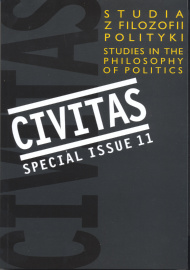Babel
Babel
Author(s): Nina Gładziuk Subject(s): Philosophy
Published by: Instytut Studiów Politycznych PAN
Keywords: Liberalism; political community; Babel; Robert Filmer; John Locke; Thomas Hobbes; state of law; liberal discourse; puritans of the 17th century
Summary/Abstract: What interests us here is the fact that Babel as a fi gure of confusion became almost the self-named epithet of 17th-century England. All the participants of the debate that took place during the revolution or the postbellum associated Babel with the conceptual chaos of the civil war. The lively “pamphlet war” then brought a pluralistic forum for public opinion in which all the confused languages of politics were equal. When all could read the Bible, everyone could read the story of Babel in their own way. But nothing could reconcile those who read the divine right of kings in it with those who read the divine right of the people in it. In the 17th century, Babel was seen as a fi gure of discursive confusion, as the confusion was experienced in the form of fanatical languages of arguing sects. Liberalism, if the Englishspeaking world is acknowledged to be its cradle, constitutes an attempt to escape the impasse of the discursive Babel via the legalistic means of the state of law. According to Hobbes, the irreversible multitude of languages makes one ask what public order can reconcile nominalism in the sphere of political opinion with the social Diaspora of individuals released from the bonds of status or corporation. How to build a state while one Christian faith is disintegrating into many sects fi ghting each other? How to build a state in the chronic pluralism of the social world and multifaceted dissociation of the traditional community? This is why Babel as a fi gure of confusion provides the primary conceptual capacity for the liberal organization of the world.
Journal: Civitas. Studia z filozofii polityki
- Issue Year: 2009
- Issue No: 11
- Page Range: 52-76
- Page Count: 25
- Language: English

